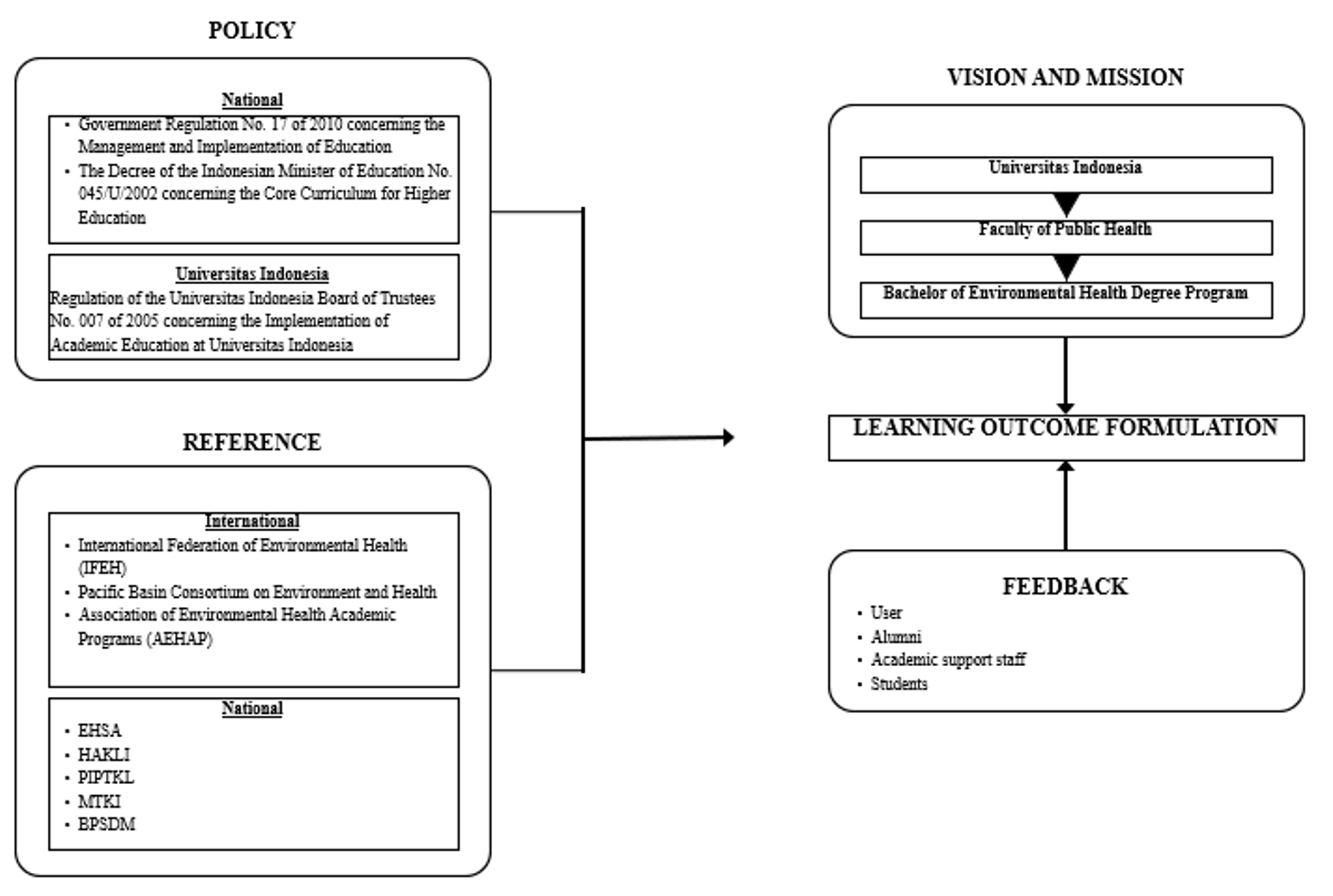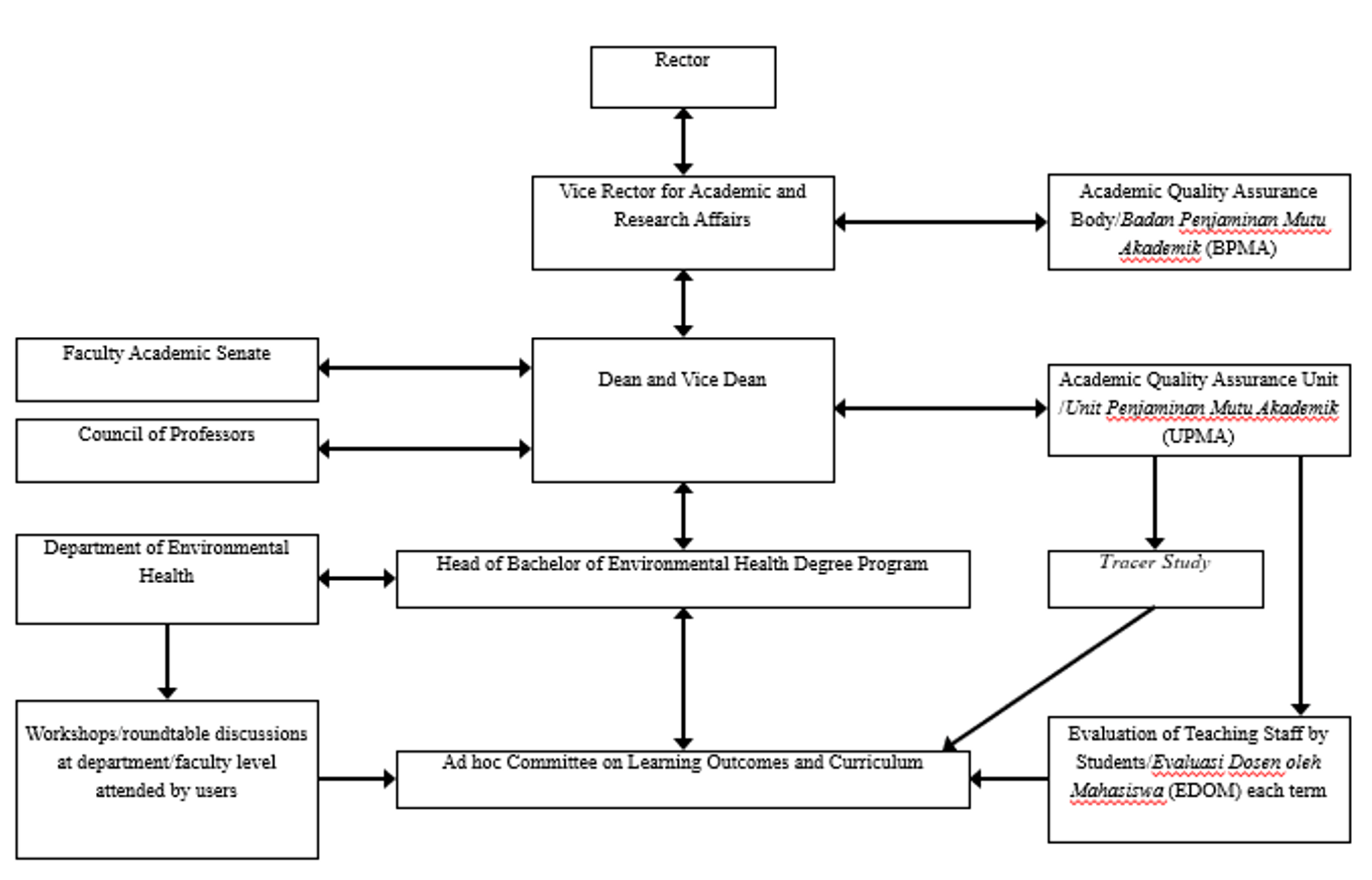- Home
- About
- Academic
- Student Affairs
- Research
- Faculty Services Unit
- LPPKM
- SDGs Initiatives
Head of the Degree Program : Fitri Kurniasari, S.K.M., M.K.K.K., Ph.D.
Secretary of the Degree Program : Dr. Ema Hermawati, S.Si., M.K.M.
The Bachelor of Environmental Health Degree Program, Faculty of Public Health, Universitas Indonesia (FPH UI) is the first Bachelor’s degree program in Environmental Health at a public university in Indonesia. At the beginning of establishment, the FPH UI only had a Bachelor of Public Health Degree Program, consisting of several specializations including Environmental Health. Due to an increasing complexity of various environmental health problems, which goes hand in hand with any follow-up to the challenges in the development of science, the Environmental Health specialization is subsequently developed into an independent study program, the FPH UI’s Bachelor of Environmental Health Degree Program, established under the Decree of the Rector of Universitas Indonesia No. 1942/SK/R/UI/2013 concerning the Permit to Organize Environmental Health Studies Program, Regular Undergraduate Education Program, Faculty of Public Health, Universitas Indonesia. Admission of new students for this program began in the odd semester of the 2014/2015 academic year.
The process of preparing the curriculum document for the Bachelor of Environmental Health Degree Program refers to various elements which include government policies, professional organizations, and associations of universities in the field of Environmental Health at the regional and national levels, reputable university curricula, the vision and mission of the university and faculty, and other stakeholders such as students, lecturers, alumni, and users.

In the process of preparing the curriculum document, the needs and policy analyses, benchmarking with various environmental health studies programs at renowned universities abroad, formulating learning outcomes with environmental health professional organizations such as Environmental Health Specialist Association (EHSA) and the Indonesian Association of Environmental Health Experts (Himpunan Ahli Kesehatan Lingkungan Indonesia/HAKLI) and with the Association of Higher Education Institutions for Environmental Health (Perkumpulan Institusi Pendidikan Tinggi Kesehatan Lingkungan/PIPTKL) were carried out. Furthermore, in developing learning outcomes and curriculum, the Bachelor of Environmental Health Degree Program at UI involved stakeholders comprising lecturers, students, alumni, and users. The stakeholder involvement in developing learning outcomes and curriculum can be seen in the following figure:

To be a center of excellence for professional education, scientific development, and service to humanity in the field of environmental health at both national and international levels (Southeast Asia)
The mission of the Bachelor of Environmental Health Degree Program is as follows:
General objective:
To create graduates with the skills and analytical abilities to address environmental health issues of high quality, international standards, based on science, dedication, ethics, and integrity.
Specific objectives:
The Bachelor of Environmental Health Degree Program has been nationally accredited with an EXCELLENT predicate since 2021. Through Government Regulation No. 66 of 2014 and Law No. 17 of 2023 concerning Environmental Health and Health Workers, the government recognizes the important role of environmental health and future bachelors of Environmental Health in disease prevention efforts. Our curriculum is designed to fulfill theoretical and analytical skills, also direct practices with partners/companies/institutions. This condition places the S.KL. (Sarjana Kesehatan Lingkungan/Bachelor of Environmental Health title) in demand by both the government and private sectors. Many of our alumni have careers as public servants and private employees at companies such as Hyundai, Freeport, Pertamina, WHO, NGOs, and so on. In the field of research, we continue to explore various technologies, programs, and innovations to address pollution issues, such as microplastic and biomarker research.
The graduate degree is Sarjana Kesehatan Lingkungan (S.KL.)
Graduate Profile:
The profiles of Bachelor of Environmental Health degree program graduates after completing their studies can play roles as sanitarian (environmental health practitioner, environmental health inspector), health microbiologist, health entomologist, HSE (health, safety and environment) practitioner, environmental health manager and administrator, and environmental health auditor. In full, the profile of the degree program graduate is one who is able to analyze environmental exposure risks, predict the health impacts of environmental exposure, and set alternative solutions to environmental health problems in accordance with technological advances as well as applicable ethics and laws.
Graduate Learning Outcomes (Capaian Pembelajaran Lulusan/CPL) of the Bachelor of Environmental Health Degree Program are as follows:
Four years (eight terms) and 144 credits at minimum
Curriculum Structure of the Bachelor of Environmental Health Degree Program
| No | Course Code | Course | Credit |
| University-level Compulsory Courses | |||
| 1 | UIGE600001 | MPK Terintegrasi (Integrated Personality Development Courses) | 6 |
| 2 | UIGE600003 | MPK Agama (Religion) | 2 |
| 3 | UIGE600004 | MPK Bahasa Inggris (English) | 2 |
| Cluster of Health Sciences-level Compulsory Courses | |||
| 4 | UILS600010 | Basics of Biomedical Sciences 1 | 2 |
| 5 | UILS600011 | Health Communications | 2 |
| 6 | UILS600014 | Collaboration and Cooperation of Health Team 1 | 2 |
| 7 | UILS600009 | Ethics and Law in the Health Sector | 2 |
| 8 | UILS600012 | Health Research Methodology | 3 |
| 9 | UILS600013 | Disaster Management | 2 |
| Faculty-level Compulsory Courses | |||
| 10 | PHF0600111 | Basics of Public Health | 3 |
| 11 | PHF0600121 | Basics of Biostatistics | 3 |
| 12 | PHF0600131 | Basics of Epidemiology | 3 |
| 13 | PHF0600141 | Global Health | 3 |
| 14 | PHF0600151 | Scientific Writing | 2 |
| 15 | UILS600016 | Collaboration and Cooperation of Health Team 2 | 2 |
| Study Program-level Compulsory Courses | |||
| 16 | PHS1600111 | Basics of Biomedical Sciences 2 | 2 |
| 17 | UILS600015 | Basics of Environmental Health | 2 |
| 18 | PHL1602121 | Environmental Chemistry and Health | 2 |
| 19 | PHL1602122 | Health Ecology | 2 |
| 20 | PHL1602123 | Environmentally-Based Diseases | 2 |
| 21 | PHL1602112 | Population, Environment, and Health | 3 |
| 22 | PHL1602131 | Environmental Health Microbiology | 3 |
| 23 | PHL1602132 | Environmental Toxicology | 3 |
| 24 | PHL1602134 | Disease Transmission Vectors | 3 |
| 25 | PHL1601142 | Vector-Borne and Zoonotic Diseases | 2 |
| 26 | PHL1602141 | Water and Soil Pollution | 3 |
| 27 | PHL1602142 | Air Pollution and Health | 3 |
| 28 | PHL1602143 | Food Safety and Health | 3 |
| 29 | PHL1602144 | Waste, Liquid Waste, and B3 (Hazardous and Toxic Materials) Management | 3 |
| 30 | PHL1601124 | Leadership in Environmental Health | 2 |
| 31 | PHL1601144 | Environmental Quality Analysis | 2 |
| 32 | PHL1602151 | Environmental Health Epidemiology | 2 |
| 33 | PHL1602152 | Environmental Health Risk Analysis | 3 |
| 34 | PHL1602154 | Environmental Health Impact Analysis | 3 |
| 35 | PHL1602145 | Environmental Health Economics | 2 |
| 36 | PHL1602161 | Environmental Health Laws and Legislation | 2 |
| 37 | PHL1602156 | Environmental Health Management | 2 |
| 38 | PHL1602157 | Environmental Health in Disasters | 2 |
| 39 | PHL1601156 | Geographic Information Systems and Spatial Analysis of Environmental Health | 2 |
| 40 | PHL1602162 | Environmental Health of Tourism and Public Places | 3 |
| 41 | PHL1602163 | Environmental Health Transportation | 3 |
| 42 | PHL1602164 | Residential Environmental Health | 2 |
| 43 | PHL1602165 | Environmental Health, Agriculture, and Livestock | 3 |
| 44 | PHL1602166 | Environmental and Industrial Health | 3 |
| 45 | PHL1602167 | Environmental Health Technology | 2 |
| 46 | Community-Based Environmental Health Fieldwork | 6 | |
| 47 | PHL1602171 | Institution-Based Environmental Health Fieldwork | 3 |
| 48 | PHL1602181 | Final Project (Undergraduate Thesis/Prototype) | 4 |
| Elective Courses | 18 | ||
Prospective Student Criteria
Admission Pathways
The admission pathways for the FPH UI Bachelor of Environmental Health Degree Program consist of the National Selection Based on Achievement (Seleksi Nasional Berdasarkan Prestasi/SNBP), National Selection Based on Test (Seleksi Nasional Berdasarkan Tes/SNBT), and the university admission selection test called SIMAK UI.
In the last three years, the FPH UI Bachelor of Environmental Health Degree Program had a competitive level of 3.06 – 6% with a student graduation rate of 100%.
Since its founding in 2013, the FPH UI Bachelor of Environmental Health Degree Program has consistently encouraged the students to take advantage of opportunities to study abroad, offered by the university through the UI International Office and collaborations with foreign universities and institutions. A variety of programs, including summer and short courses, have been actively participated in by the FPH UI students. These activities provide numerous positive values, such as enhancing students’ academic knowledge and experience, as well as developing relationships and understanding of global cultures.
In 2020, the FPH UI Bachelor of Environmental Health Degree Program began offering students the opportunity to participate in the Independent Learning Campus (Merdeka Belajar Kampus Merdeka/MBKM) program by incorporating it into the curriculum and learning system. Off-campus activities that students can participate in under this program include internships and certified independent studies (Magang dan Studi Independen Bersertifikat /MSIB), independent student exchanges both domestically and internationally (Indonesian International Student Mobility Awards/IISMA), community engagement activities, and others. In addition, students can gain professional insight and experience through any Institutional Field Learning Experience activities at agencies such as regional health office, environmental office, the Indonesian Ministry of Health, the Indonesian Food and Drug Authority, UI Hospital, primary health care, the Center for Public Health Laboratories, also state-owned enterprises and private companies such as PT Indocement Tunggal Prakarsa Tbk., PT Angkasa Pura Suport, PT Kilang Pertamina Internasional, PT Kereta Commuter Indonesia, PT PLN Indonesia Power UBP Priok, and so on.
In addition to formal classroom learning, the FPH UI Bachelor of Environmental Health Degree Program also provides opportunities for students to develop themselves through non-academic activities. The degree program has a student association called the Environmental Health Student Association (Envihsa), providing a platform for students to gain leadership and organizational experience, enhance their creativity and innovation skills, foster environmental and social awareness and sensitivity, and develop professionalism in the field of environmental health.
The Envihsa has four flagship programs: Envicare, One Envihsa, Envihsa Visiting and Networking Company (ENVICOM), and Envifair. The following is a description of each flagship program:
In addition to its flagship program, the Envihsa also has other regular programs that benefit not only the FPH UI Department of Environmental Health students but also the wider community. These work programs include ‘EnviTalk’ (open discussions on environmental health topics by relevant speakers in their fields), ‘Prencess’ (joint classes in the form of discussions as academic preparation for environmental health courses), and ‘Come on KL’ (disseminating information on seminars, competitions, workshops, internships, and volunteering related to environmental health).
Apart from the activities held by the Envihsa, the degree program students can also participate in other informal activities at the faculty, university, national and international levels.
Based on data from the Tracer Study survey for the Environmental Health Studies Program, the waiting period for graduates to find their first job is ≤ 3 months. Graduates’ employment areas are as follows:
Phone : +6221 7863479 / +62 8111 0557 000
E-mail : psklfkmui@gmail.com
Address : Building C 2nd Floor, Faculty of Public Health, Universitas Indonesia, Depok City, West Java Province, Zip Code 16424
